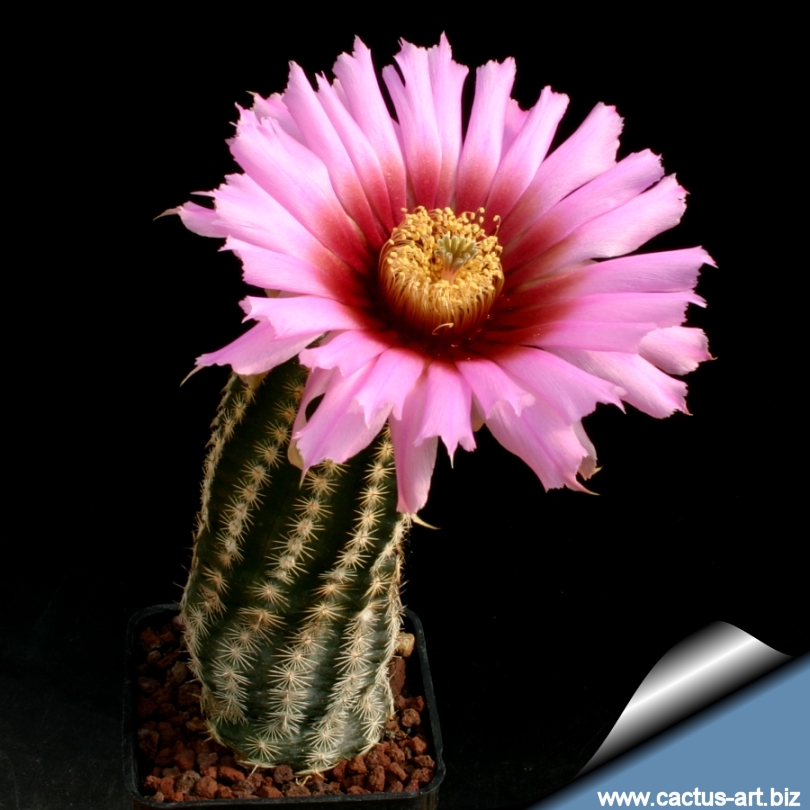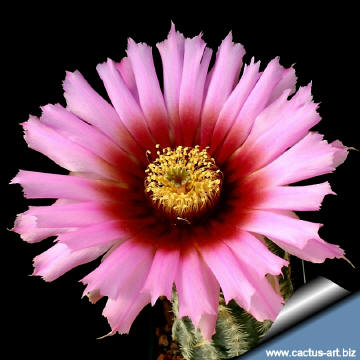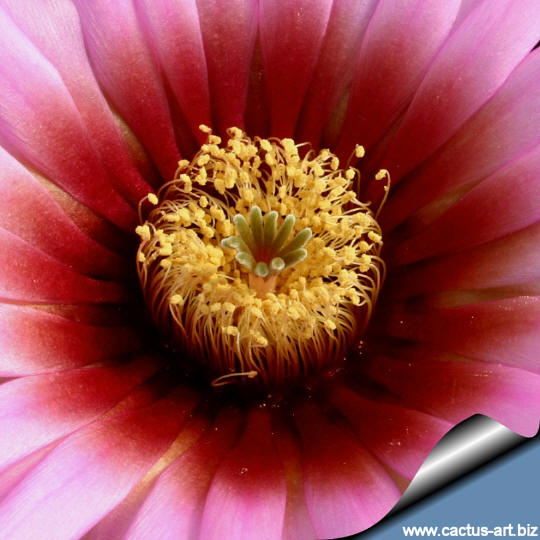|
|
|

Echinocereus
reichembachii var. albertii (Black Lace Cactus)
This cactus has large, pretty pink flowers with a very dark
center. It's rarity makes it particularly desirable to collectors.
|
 |
Description:
Single or branching when old.
Stem: Cylindrical, deep green in color, 3 to 15 cm long, 3 to 5
cm thick;
Ribs: 10 to 13; tuberculate;
Areoles: elliptic, 1.5 mm long, almost touching;
Spines: dark; cental spines 0, or 1, 2 to 3 mm long, purple-
black in color, perpendicular to the stem, or turning slightly upward;
The radial spines and white with dark purple tips spines, number 14 to
20, straight, closely pectinate, 3 to 6 mm long;
Flowers: are 5 to 8 cm long, 5 to 7.5 cm wide, and pink to purple
in colour with a very dark purple-brown throat.
Budding and Anthesis: Occur intermittently through the spring and
summer.
Fruit: green
|
|
Remarks: The taxonomic and geographic boundaries among the
segregate species or infraspecific taxa of Echinocereus reichenbachii
remain nebulous and controversial. In no place do pure populations exist
sympatrically, and all taxa appear completely interfertile.
E. reichenbachii var. albertii is
intermediate between E. reichenbachii var. reichenbachii, with a
more northern distribution, and E. reichenbachii var. fitchii,
with a more southern distribution in the Rio Grande Valley. E.
melanocentrus is an invalid name of uncertain application, perhaps
referable to E. reichenbachii var. albertii.
Photo of conspecific
taxa, varieties, forms and
cultivars taxa
of
plants belonging to the
Echinocereus reichenbachii
complex
(This
Taxon
has lots of synonyms whit several controversial varieties and subspecies):
|
|
Advertising
|
|
|
|
|
Family:
Cactaceae (Cactus
Family) |
Scientific name:
Echinocereus reichenbachii var albertii
L. Benson
Type specimen: The type
specimen (Albert and Benson 1955) is on deposit at Pomona College (POM
317080).
Common Name: Black lace cactus
Synonyms:
- Echinocereus
reichenbachii subsp. fitchii
(Britton & Rose) N. P. Taylor
Origin: Known populations of the black lace cactus are in
Kleberg, Jim Wells, and Refugio counties of south Texas.
Conservation status: Listed in
CITES appendix 2.
Currently less than 4000 plants are known in the wild, with several
populations being destroyed. The black lace cactus is endangered because
its rangeland habitat has been cleared or planted to crops.
Habitat: It is found in in open unshaded
grassy areas, and or under heavy brush on south Texas rangeland invaded
by mesquite and other shrubs. The local topography is fairly flat, with
water standing after heavy rains. The elevation varies from 3 to 60
meter. The climate is semi-arid. Black lace cactus occurs on somewhat
saline clay and silt sheets (composed of clay, fine silt sand and
gravel)
|
|
|
 |
|
Cultivation: It is
sensitive to overwatering (rot prone) needs a very good drainage to
avoid rotting, but requires more moisture than true desert cacti
to grow and produce flowers, Keep drier and cool in
winter. Need full sun. It is very cold resistant from -10° to
-25° C (depending on clones) or less for short
periods of time. It is a fine plant for a rock garden or
container, contrasts well with agaves, yuccas, and low-growing flowering
plants.
Propagation: Seeds, also can be grown from cutting as it slowly branches from the base;

 |
|